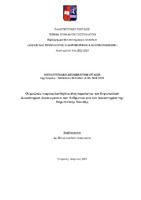Οι μαζικές παρακολουθήσεις στη νομολογία του Ευρωπαϊκού Δικαστηρίου Δικαιωμάτων του Ανθρώπου και του Δικαστηρίου της Ευρωπαϊκής Ένωσης
Mass surveillance of communications in the ECtHR and CJEU jurisprudence

Master Thesis
Συγγραφέας
Φεϊζίδου, Σοφία - Δέσποινα
Ημερομηνία
2023-04Επιβλέπων
Παπανικολάου, ΑικατερίναΠροβολή/
Λέξεις κλειδιά
Μαζικές παρακολουθήσεις ; Προστασία ; Απορρήτου των επικοινωνιών ; Χωρικές άρσεις ; Διατήρηση δεδομένων επικοινωνίας ; Big Brother Watch ; United Kingdom ; Mass surveillance ; Bulk interception regimes ; Νομολογία ΕΔΔΑ ; Νομολογία ΔΕΕΠερίληψη
Η παρούσα μελέτη έχει ως στόχο να εξετάσει την εξέλιξη της νομολογίας των δύο ανωτάτων ευρωπαϊκών δικαστηρίων, του Ευρωπαϊκού Δικαστηρίου των Δικαιωμάτων του Ανθρώπου (εφεξής: ΕΔΔΑ) και του Δικαστηρίου της Ευρωπαϊκής Ένωσης (εφεξής: ΔΕΕ), στο πεδίο των μαζικών παρακολουθήσεων, ενός πολύτιμου εργαλείου των υπηρεσιών πληροφοριών για την καταπολέμηση σοβαρών εγκλημάτων και της τρομοκρατίας. Κατ’ αρχάς, παρουσιάζεται ένας ορισμός των μαζικών παρακολουθήσεων και τα ειδοποιά γνωρίσματα της έννοιας αυτής και διερευνώνται τα αίτια, κυρίως κοινωνικά και πολιτικά σε διεθνές επίπεδο, υιοθέτησης της εν λόγω τεχνικής από τις υπηρεσίες ασφαλείας. Στην πρώτη ενότητα αναλύονται οι διατάξεις του ΧΘΔΕΕ και της ΕΣΔΑ οι οποίες κατοχυρώνουν το δικαίωμα στην προστασία του απορρήτου της επικοινωνίας ως ιδιαίτερη έκφανση του δικαιώματος σεβασμού της ιδιωτικής και οικογενειακής ζωής στο ενωσιακό και διεθνές δίκαιο αντίστοιχα και τις οποίες λαμβάνουν υπόψιν τους τα δύο δικαστήρια όταν καλούνται να εξετάσουν την νομιμότητα περιορισμών στο εν λόγω δικαίωμα υπό τη μορφή καθεστώτων μαζικής επιτήρησης. Στην δεύτερη ενότητα παρουσιάζονται τα κριτήρια που εισάγει η διάταξη του άρθρου 8 § 2 της ΕΣΔΑ και τα οποία πρέπει να πληρούνται για να θεωρηθεί νόμιμος τούτος ο περιορισμός στο δικαίωμα της απόρρητης, ελεύθερης επικοινωνίας, όπως ερμηνεύθηκαν από την πλούσια νομολογία του ΕΔΔΑ και αναλύονται οι πρόσφατες αποφάσεις Big Brother Watch and Others v. United Kingdom και Centrum för rättvisa v. Sweden με τις οποίες το Δικαστήριο του Στρασβούργου νομιμοποιεί τις μαζικές παρακολουθήσεις. Στην τρίτη ενότητα αναλύονται οι αποφάσεις του ΔΕΕ για την γενική και άνευ διακρίσεων διατήρηση μεταδεδομένων επικοινωνίας, οι οποίες εξεδόθησαν κατόπιν της αμφισβήτησης της σχετικής ευρωπαϊκής και εθνικής νομοθεσίας. Τέλος, πραγματοποιείται μία συγκριτική επισκόπηση των αρχών που αναπτύχθηκαν στην νομολογία του ΕΔΔΑ και του ΔΕΕ, αναλύονται οι ομοιότητες και οι διαφορές στο σκεπτικό τους και οι πιθανές συνέπειες της κοινής προσέγγισης ή της διαφοροποίησής τους για την προστασία των θεμελιωδών δικαιωμάτων στην Ευρωπαϊκή Ένωση.


